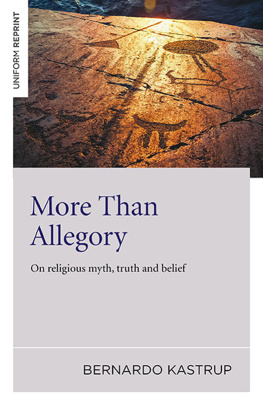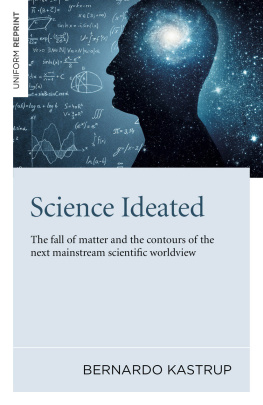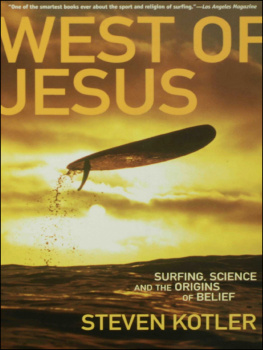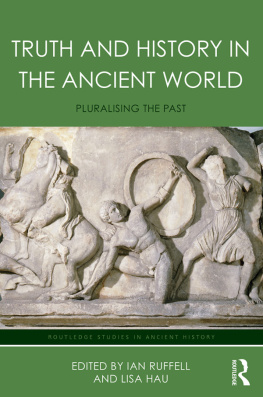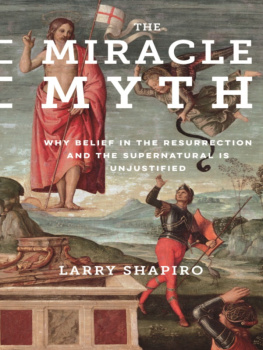First published by iff Books, 2016
iff Books is an imprint of John Hunt Publishing Ltd., No. 3 East St., Alresford,
Hampshire SO24 9EE, UK
www.johnhuntpublishing.com www.iff-books.com
For distributor details and how to order please visit the Ordering section on our website.
Text and figures copyright 2012-2017 by Bernardo Kastrup
Introduction copyright 2015 by Jeffrey J. Kripal
ISBN: 978 1 78535 287 4
ISBN: 978 1 78535 288 1 (ebook)
Library of Congress Control Number: 2015953413
All rights reserved. Except for brief quotations in critical articles or reviews, no part of this book may be reproduced in any manner without prior written permission from the publishers.
The rights of Bernardo Kastrup as author have been asserted in accordance with the Copyright, Designs and Patents Act 1988.
A CIP catalogue record for this book is available from the British Library.
Cover photo: ancient Karelian Onega petroglyphs depicting mythological, probably religious symbols.
Design: Stuart Davies
UK: Printed and bound by CPI Group (UK) Ltd, Croydon, CR0 4YY
US: Printed and bound by Thomson Shore, 7300 West Joy Road, Dexter, MI 48130
We operate a distinctive and ethical publishing philosophy in all areas of our business, from our global network of authors to production and worldwide distribution.
CONTENTS
Other books by Bernardo Kastrup
Rationalist Spirituality:
An exploration of the meaning of life and existence informed by logic and science
Dreamed up Reality:
Diving into mind to uncover the astonishing hidden tale of nature
Meaning in Absurdity:
What bizarre phenomena can tell us about the nature of reality
Why Materialism Is Baloney:
How true skeptics know there is no death and fathom answers to life, the universe, and everything
Brief Peeks Beyond:
Critical essays on metaphysics, neuroscience, free will, skepticism and culture
Coming March 2019
The Idea of the World:
A multi-disciplinary argument for the mental nature of reality
Acknowledgments
This book has evolved and taken shape slowly. I am indebted to those who graciously read and commented on its earlier drafts. Their contribution has been invaluable. At the risk of leaving out equally important names, Id like to explicitly acknowledge Jeffrey Kripal, Saajan Patel, Rob van der Werf, Paul Stuyvenberg, Richard Stuart, Robert Perry, Peter Jones, Deepak Chopra and Rupert Spira. I am particularly indebted to Jeff for his encouragement and validation of my work, his valuable criticisms, as well as the wonderful introduction he wrote for this book. I am also particularly grateful to Paul and Rob, friends who were there with me that crucial evening, in that crucial restaurant.
I am thankful to my mother for having planted in me, at a very early agebefore my intellectual development would have made it impossiblethe seeds of religious transcendence. I would discern their meaning and value only much later in life, having denied them at first.
Finally, my girlfriend Claudia Damian has been the inspiration behind this work. Her spontaneous, genuine and intimate connection with religion rekindled in me a way of being Id lost touch with. Her example gave me courage to acknowledge views and events I thought Id never dare to acknowledge. This book exists largely thanks to her, though it is not meant for her: she doesnt need it.
Introduction by Jeffrey Kripal:
Reading Inside Gods Brain
I was so delighted when I found Bernardo Kastrups books. Actually, I didnt find them. A mutual colleague working in Paris on medieval Christianity, Troy Tice, read us both and encouraged me to read Bernardo. He thought our books somehow spoke to one another, and that I would appreciate Bernardos books. Troy could not have been more right. I read all five of Bernardos previous books within a few weeks. Just gobbled them up.
I have thought about why I did this. I seldom read this many books by a single author. Indeed, at mid-life, I barely have time or energy to read at all. But this was different. I just dropped everything and read, and read, and read. Why? What did this authors words awaken in me? What glowing ember did he spark back to life in this exhausted middle-aged professor?
Part of my enthusiasm was a double function of Bernardos philosophical precision and contemporary relevance. Obviously, here was a man who could think, but who could also speak to the digital age on its own terms and against its own obsessions and nave uses of computer metaphors for understanding consciousness (more on that in a moment). Part of my pleasure was also a function of the fact that the author is an unapologetic idealist, that is, someone who is convinced that mind or consciousness is the fundamental nature of reality. I was very familiar with this position, but I had never actually met an idealist. They are terribly rare these days, at least in the academic circles in which I move.
Oh, I had read plenty of idealists within my own historical area of research, and Bernardo sounds a lot like the comparative mystical literature to which I have given my lifeexcept that, But he died over thirty years ago.
Dick is worth dwelling on for a moment here, as his weird thought eerily reflects the more precise and calmer books of Bernardo Kastrup. Both certainly share a digital or computer-based model of intellectual cognition. Both also understand that consciousness is not intellectual cognition. Here is a typical passage from Dicks Exegesis, the 8,000 page private journal that Dick scrawled in the last eight years of his life after getting energetically zapped in the winter of 1974 by a cosmic Mind that he came to call VALIS, for Vast Active Living Intelligence System:
All that I could fathom was that the conventional picture that we normally getand seem to shareis not in fact what is there; what is there is not even in time or space, nor is causation involved. There seems to be a mind and we are in it . We are all but cells in a colossal mad brain that both makes and perceives realitysomething like that, the main thrust being that there is some relationship between the creating of reality and perceiving of it the percipient is cosmogenitor [literally, creator of the universe], or
You will see, in due time, just how close Dicks Valis is to the idealist vision worked out in the following pages. In Bernardos system, the conventional picture of material reality that we assume to be the case is simply false. Its an extremely elaborate hoax. More accurately, this material world can be thought of as a kind of dream in which God incarnates through sexual reproduction and evolutionary biology in order to reflect back on itself and come to know itself inside the dream. We are all living in Gods brain. More on that in a moment, too.
So there was Bernardos philosophical precision and contemporary relevance, and there was the uncanny way that his words resonate with the comparative mystical literatures I know and love. But there was also something more that drew me to these books, and to this book in particular: the fact that Bernardo Kastrup emerged from the professional fields of physics, mathematics, and computer science and is a successful computer engineer in the corporate world. I confess that I was so pleased by this because I have long found the pretensions of the Artificial Intelligence world to be patently stupid. Thats a bit inappropriate, and it is certainly crabby, but it is nonetheless honest and, I think, quite accurate.

